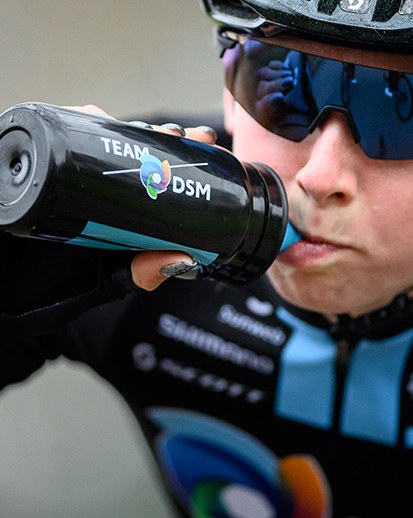Committees
The Supervisory Board has four committees to cover key areas in greater detail: Nomination, Remuneration, Sustainability and Audit. These are described in more detail below.
Board nominations
The Nomination Committee comprises Rob Routs (Chair), Eileen Kennedy, Pauline van der Meer Mohr and Thomas Leysen. Geraldine Matchett, Dimitri de Vreeze and Cristina Monteiro, Executive Vice President Group People & Organization, were also involved in this Committee’s discussions. The Committee met five times in 2020. The recommendations and minutes of all Nomination Committee meetings were shared with the entire Supervisory Board. This feedback included advice and recommendations regarding topics to be approved by the full Supervisory Board. The Supervisory Board also has access to all the meeting materials posted for the Nomination Committee meetings.
In 2020, discussions in this committee focused on succession planning for the Managing Board, the Executive Committee, and the Supervisory Board. With respect to the Executive Committee, the discussions focused on the portfolio changes for Philip Eykerman, who took on the responsibility for the Human Nutrition and Health business in the course of the year, and the succession of the Executive Vice President Group People & Organization.
As in other years, the Supervisory Board established that the composition of the Managing Board is and will stay diverse in nationality, gender, background, expertise and experience, and that it provides a good foundation to support all clusters and business groups in achieving their targets and thus contributing to the company strategy. For detailed background information on the Managing Board members, see the company website under Corporate Governance and in the Managing Board section of this Report.
Taking into account the Supervisory Board profile as laid down in the Supervisory Board regulations, the Nomination Committee continued discussions on the overall composition of the Supervisory Board and discussed succession planning for the Supervisory Board. At the 2020 Annual General Meeting of Shareholders, Thomas Leysen was appointed to the Supervisory Board. Furthermore, Rob Routs, Eileen Kennedy and Pradeep Pant were reappointed. In view of Pauline van der Meer Mohr stepping down at the 2021 Annual General Meeting of Shareholders, the Nomination Committee looked for a successor with a similar profile. The Nomination Committee eventually proposed a new candidate for appointment to the Supervisory Board, Carla Mahieu, whose profile is closely comparable with that of Pauline van der Meer Mohr.
Board remuneration
The Remuneration Committee had five meetings in 2020. Pauline van der Meer Mohr (Chair), Rob Routs, John Ramsay and Frits van Paasschen are members of this committee. Recommendations and minutes of the Remuneration Committee meetings were shared with the full Supervisory Board and were used to determine the final remuneration of the members of the Managing Board. The Supervisory Board also has access to all the meeting materials provided for the Remuneration Committee meetings. For more information on the remuneration policy, see the company website. For the implementation of that policy in 2020, see the Remuneration report 2020.
Discussions focused on the performance and the related remuneration of the members of the Managing Board, in respect of both company and individual performance. In 2020, time was spent on remuneration topics related to the Short-Term Incentive (STI) and Long-Term Incentive (LTI) scorecard. Attention was given both to the setting of targets for 2020 and to first estimates of performance against those targets, gender pay gap, equal pay, and next steps to be taken in the Remuneration Report in terms of disclosures. The performance and remuneration of the Executive Committee members were also shared with the Remuneration Committee. Geraldine Matchett, Dimitri de Vreeze and Cristina Monteiro were also partly involved in these discussions.
Sustainability
The Sustainability Committee prepares the Supervisory Board’s discussions on sustainability topics. The Sustainability Committee met three times in 2020. This Committee comprises Eileen Kennedy (Chair), Pradeep Pant, and Erica Mann. The Chair of the Supervisory Board has a standing invitation and participated in all meetings. The recommendations and minutes of these meetings were shared and discussed with the entire Supervisory Board during its meetings with the Managing Board. The Supervisory Board has access to all the meeting materials provided for the Sustainability Committee meetings. The feedback from the Committee to the full Board included advice and recommendations regarding topics to be approved by the Supervisory Board, in particular the sustainability reporting in this Report. Taking into consideration the draft Assurance report of the independent auditor on the Sustainability Information by KPMG of this Report, the full Supervisory Board approved the reporting against these topics on 1 March 2021. The assurance report was finalized by KPMG after the approval of the Supervisory Board. The Sustainability Information complies with the Standards of the Global Reporting Initiative and our internal reporting criteria, which are included in this Report, and is also aligned with the international Integrated Reporting Council <IR> Framework where possible.
During the year, recurring topics were the company’s performance against its People and Planet aspirations, with a focus on safety, emissions reduction, Brighter Living Solutions, and Inclusion & Diversity. Through these discussions, the Sustainability Committee followed up on the progress made with the implementation of the sustainability and safety aspirations set as part of the company’s Deep dives were made into several topics. One was our greenhouse gas roadmap, both scope 1 & 2 as well as scope 3 emissions. In terms of Inclusion & Diversity, the Committee discussed a new approach and the company’s long-term strategy. In light of our strategy the Committee also made a deep dive into alternative proteins with a team from DSM Food Specialties that is also involved in Olatein, our joint venture with Avril for canola-based protein.
Financials and auditing
The activities of the Supervisory Board in the area of financials and auditing are prepared by the Audit Committee. The Audit Committee met six times in 2020. John Ramsay (Chair), Pradeep Pant, Frits van Paasschen, Erica Mann and Thomas Leysen are members of the Audit Committee. All Supervisory Board members have a standing invitation to attend Audit Committee meetings. In 2020, most of them used this standing invitation for the two conference calls in which the financial developments and interim results for the first and third quarter were discussed, as these are not followed by a full Supervisory Board meeting. The Chair of the Supervisory Board participated in all meetings and calls. The highlights and the minutes of all Audit Committee meetings were shared with the full Supervisory Board. This feedback included advice and recommendations regarding topics to be approved by the full Supervisory Board. In 2020, these included the approval of the 2021 COA Audit plan, the proposed reappointment of the external auditor (approved by the 2020 Annual General Meeting of Shareholders), and the proposed funding of the acquisition of the Erber Group. All Supervisory Board members have access to all the meeting materials posted for the Audit Committee meetings.
Our external auditor KPMG, Geraldine Matchett in her capacity as CFO, and the Senior Vice President Group Controller participated in all the meetings of the Audit Committee. So did Dimitri de Vreeze in his capacity as Co-CEO, along with the managers responsible for internal audit, risk management and compliance, with the exception of the two meetings in which the financial developments and interim results for the first and third quarter were discussed. After every meeting, with the exception of the two conference calls in which the financial developments and interim results for the first and third quarter are discussed, the Audit Committee meets with the external auditor without the Managing Board being present.
The Committee had in-depth discussions on the company’s financials; the Finance plan; the Capital Expenditure plan; dividend proposals; the financial statements and accounting policy changes. The discussions on internal risk management and control systems included the internal control framework, compliance with recommendations and observations made by internal and external auditors, and the role and functioning of COA. They also included the endorsement of COA’s proposed audit plan for 2021, which was subsequently approved by the full Board. As part of the Corporate Risk Assessment, the company’s main risks and their mitigation were discussed. The Committee also discussed and evaluated cases submitted under the company whistleblower policy (DSM Alert), fraud cases, on-going litigation, and privacy compliance. Another recurring topic is our cybersecurity resilience, about which the Audit Committee is informed through a dashboard, as well as information on running cybersecurity programs and cybersecurity governance. A deep dive on Group Business Services and IT strategy were specific topics dealt with in 2020.
Discussions were held with KPMG about the audit plan, management letter, audit report and financial statements for 2020, including managerial judgments and key accounting estimates. In its management letter, KPMG shared the outcome of its evaluation of the company’s procedures and system of internal controls to the extent necessary within the scope of the audit of the financial statements. The observations of KPMG were presented along the pillars that support our in-control statement and focused specifically on the Internal Control Framework pillar as this is also where DSM had set out on an improvement journey several years ago (for the Statements of the Managing Board, and for a visualization of our control environment see Corporate governance). Given the increased maturity level of our internal Control Framework we have set further ambitions for the coming years. In its management letter KPMG identified several opportunities in making our framework more effective and efficient.
Finally, in 2020, the Audit Committee formally evaluated the external auditor, and discussed the reappointment of KPMG. The proposal to reappoint KPMG is based on the Audit Committee’s own assessment of KPMG, on discussions with KPMG in the absence of management, and on the outcome of an evaluation among DSM executives. The Audit Committee conducts a more in-depth evaluation once every three years; in the two other years, a lighter evaluation is performed. For 2020, a more in-depth evaluation was performed, also in view of the change in lead audit partner for that reporting year. The auditor evaluations in prior years were positive and the outcome of the 2020 evaluation was positive as well.
Brighter Living Solutions (BLS) is DSM’s program for the development of sustainable, innovative solutions with environmental and/or social benefits, creating shared value for our stakeholders. Brighter Living Solutions are products, services and technologies that, considered over their life cycle, offer a superior environmental impact (ECO+) and/or a superior social impact (People+) when compared to the mainstream alternative for the same application. The impact of Brighter Living Solutions can be realized at any stage of the product life cycle, from raw materials through the manufacturing process to potential re-use and end-of-life disposal.
Within the program, DSM conducts an annual ‘Product Category Sustainability Review’ for all product categories. This review identifies environmental and social impact differentiators and risks for each of our product categories and confirms the mainstream reference solution. To substantiate the identified differentiators DSM uses comparative Life Cycle Assessments (LCAs) and/or expert opinions to determine whether a product has a superior performance and can be identified as a Brighter Living Solution.







